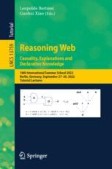Search
Search Results
-
Learning the Parameters of Probabilistic Answer Set Programs
Probabilistic Answer Set Programming (PASP) is a powerful formalism that allows to model uncertain scenarios with answer set programs. One of the...
-
Approximate Inference in Probabilistic Answer Set Programming for Statistical Probabilities
“Type 1” statements were introduced by Halpern in 1990 with the goal to represent statistical information about a domain of interest. These are of...
-
Inference in Probabilistic Answer Set Programming Under the Credal Semantics
Probabilistic Answer Set Programming under the credal semantics (PASP) describes an uncertain domain through an answer set program extended with...
-
A Constrained Optimization Approach to Set the Parameters of Probabilistic Answer Set Programs
Probabilistic Answer Set Programming under the credal semantics has emerged as one of the possible formalisms to encode uncertain domains described...
-
MAP Inference in Probabilistic Answer Set Programs
Reasoning with uncertain data is a central task in artificial intelligence. In some cases, the goal is to find the most likely assignment to a subset...
-
Statistical Relational Extension of Answer Set Programming
This tutorial presents a statistical relational extension of the answer set programming language called...
-
Rethinking Answer Set Programming Templates
In imperative programming, the Domain-Driven Design methodology helps in co** with the complexity of software development by materializing in code...
-
Using answer set programming to deal with boolean networks and attractor computation: application to gene regulatory networks of cells
Deciphering gene regulatory networks’ functioning is an essential step for better understanding of life, as these networks play a fundamental role in...
-
Generative Datalog and Answer Set Programming – Extended Abstract
Generative Datalog is an extension of Datalog that incorporates constructs for referencing parameterized probability distributions. This augmentation...
-
Modeling PU learning using probabilistic logic programming
The goal of learning from positive and unlabeled (PU) examples is to learn a classifier that predicts the posterior class probability. The challenge...

-
From Probabilistic Programming to Complexity-Based Programming
The paper presents the main characteristics and a preliminary implementation of a novel computational framework named CompLog. Inspired by...
-
Heuristics, Answer Set Programming and Markov Decision Process for Solving a Set of Spatial Puzzles*
Spatial puzzles composed of rigid objects, flexible strings and holes offer interesting challenges for reasoning about spatial entities that are...

-
Statistical Statements in Probabilistic Logic Programming
Probabilistic Logic Programs under the distribution semantics (PLPDS) do not allow statistical probabilistic statements of the form “90% of birds...
-
IASCAR: Incremental Answer Set Counting by Anytime Refinement
Answer set programming (ASP) is a popular declarative programming paradigm with various applications. Programs can easily have so many answer sets...
-
Model Checking for Probabilistic Multiagent Systems
In multiagent systems, agents usually do not have complete information of the whole system, which makes the analysis of such systems hard. The...
-
Inductive learning of answer set programs for autonomous surgical task planning
The quality of robot-assisted surgery can be improved and the use of hospital resources can be optimized by enhancing autonomy and reliability in the...

-
Combining expert-based beliefs and answer sets
Answer Set Programming (ASP) is a declarative knowledge representation language that uses a non-monotonic reasoning mechanism to search for all...

-
Score-Based Explanations in Data Management and Machine Learning: An Answer-Set Programming Approach to Counterfactual Analysis
We describe some recent approaches to score-based explanations for query answers in databases and outcomes from classification models in machine...
-
Explanations as Programs in Probabilistic Logic Programming
The generation of comprehensible explanations is an essential feature of modern artificial intelligence systems. In this work, we consider...
-
Logic programming for deliberative robotic task planning
Over the last decade, the use of robots in production and daily life has increased. With increasingly complex tasks and interaction in different...

